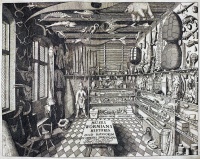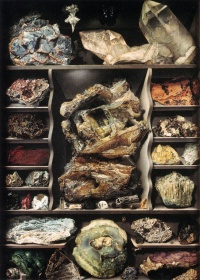Archive
From The Art and Popular Culture Encyclopedia
|
Related e |
|
Featured: |
An archive is an accumulation of historical records – in any media – or the physical facility in which they are located.
Etymology
The English word archive is derived from the French archives (plural), and in turn from Latin archīum or archīvum, the romanized form of the Greek ἀρχεῖον (arkheion). The Greek term originally referred to the home or dwelling of the Archon, a ruler or chief magistrate, in which important official state documents were filed and interpreted; from there its meaning broadened to encompass such concepts as "town hall" and "public records". The root of the Greek word is ἀρχή (arkhē), meaning among other things "magistracy, office, government", and derived from the verb ἄρχω (arkhō), meaning "to begin, rule, govern" (also the root of English words such as "anarchy" and "monarchy").
The word archive is first attested in English in the early 17th century, and the word archivist in the mid 18th century, although in these periods both terms are usually found used only in reference to foreign institutions and personnel. Not until the late 19th century did they begin to be used at all widely in domestic contexts.
History
The practice of keeping official documents is very old. Archaeologists have discovered archives of hundreds (and sometime thousands) of clay tablets going back to the third and second millennia BC in sites like Ebla, Mari, Amarna, Hattusas, Ugarit, and Pylos. These discoveries have been fundamental to know ancient alphabets, languages, literature, and politics.
Archives were well developed by the ancient Chinese, the ancient Greeks, and ancient Romans (who called them Tabularia). However, they have been lost, since documents written on materials like papyrus and paper deteriorated at a faster pace, unlike their stone tablet counterparts. Archives of churches, kingdoms, and cities from the Middle Ages survive and have often kept their official status uninterruptedly until now. They are the basic tool for historical research on these ages.
England after 1066 developed archives and archival research methods. The Swiss developed archival systems after 1450.
Modern archival thinking has many roots from the French Revolution. The French National Archives, who possess perhaps the largest archival collection in the world, with records going as far back as 625 A.D., were created in 1790 during the Revolution from various government, religious, and private archives seized by the revolutionaries.
See also
- Archival informatics
- Archival research
- Archival science
- Archive Fever (book by Jacques Derrida)
- Archive file
- Archivist
- Backup
- BS 5454
- Collection (museum)
- Computer data storage
- Data proliferation
- Database
- Archives management
- Digital preservation
- Greenstone (software)
- Historical document
- Information management
- Information repository
- International Council on Archives
- Internet Archive
- Manuscript processing
- Preservation (library and archival science)
- Time capsule
- List of archives and List of national archives




